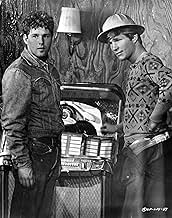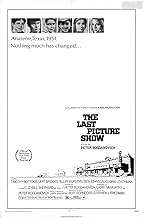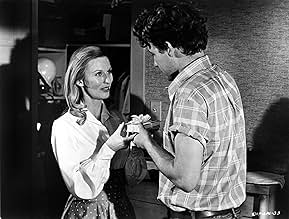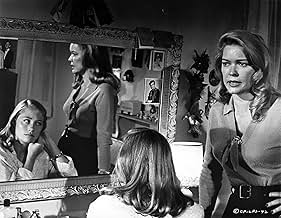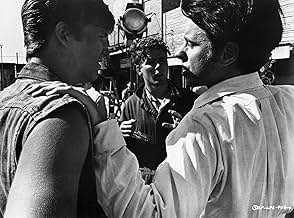Em 1951, um grupo de estudantes do ensino médio chegou à idade adulta em uma cidade desolada, isolada e atrofiada no norte do Texas que está morrendo lentamente, tanto cultural como economic... Ler tudoEm 1951, um grupo de estudantes do ensino médio chegou à idade adulta em uma cidade desolada, isolada e atrofiada no norte do Texas que está morrendo lentamente, tanto cultural como economicamente.Em 1951, um grupo de estudantes do ensino médio chegou à idade adulta em uma cidade desolada, isolada e atrofiada no norte do Texas que está morrendo lentamente, tanto cultural como economicamente.
- Direção
- Roteiristas
- Artistas
- Ganhou 2 Oscars
- 19 vitórias e 22 indicações no total
- Charlene Duggs
- (as Sharon Taggart)
Avaliações em destaque
The story centers around two best friends, Sonny (Timothy Bottoms) and Duane (Jeff Bridges), as they pass from being high school seniors into adult life. Given their backgrounds, coming from broken homes and living in boarding houses, there is little idea that they will go to college. The movie details how the two handle this pivotal and bewildering time from being on the high school football team one year to being on their own without much of a safety net the next. In a wider context the movie is about larger transitions: from youth to adulthood for the young people, from a frustrated and bored middle age to an even less promising future for the older folks, and from a town with some social cohesiveness to a town dealing with the isolating effects of a bankrupt economy and the advent of television. The rather bleak prospects that Sonny and Duane face parallel the prospects of the town. You are made to think about transitions in your own life.
The movie is populated with many finely drawn characters, all acted with supreme skill. There is not a false note struck in the entire movie. By the end we know the characters so well that they seem real. Jeff Bridges was nominated for an Oscar, and I don't understand why Timothy Bottoms was not nominated as well, since his performance is of equal quality. Bottoms plays Sonny with such genuine good-natured charm and honest sincerity that it is hard to believe he is acting. And Ben Johnson and Cloris Leachman both won well-deserved Oscars. Kudos all round to the entire cast.
The movie is beautifully filmed in black and white befitting the stark settings and story, and the time period. It is filmed as if it were made in the period portrayed.
If you have ever lived in a small town or if you grew up in the American heartland in the 1950s, this movie will evoke overwhelming nostalgia. But the story is so powerfully told that I think that for everyone it will evoke nostalgia for a time and place, even for that which they may never have known.
The town, as well as the movie, is held together by Sam the Lion (Ben Johnson) who owns the movie theater, the café, and the pool hall. In fact he owns just about everything there is to do in Anarene, except for watching the hapless Anarene High football team ... and sex. It is no wonder then that sex, in its many faceted varieties, plays a big role in this town, and in this movie.
There are so many wonderful and memorable scenes that it would simply require a small volume to recount them. One scene that grabbed me was when Sam and Sonny are at a lake outside of town, ostensibly fishing, and Sam reminiscences about old times, about when he came to the lake twenty years earlier with a lover. Sam makes the comment, "You wouldn't believe how this land has changed." The camera pans the surroundings and it is hard to see how this area could have changed much in the last thousand years, but Sam is clearly attuned to the subtle changes, since memories were impressed on him in a time of strong emotion. We all have clear memories from when and where we have been happy, even if it is a small lake in a desolate flat land. And Sam's specific comment can be taken to apply more generally to the basic theme of the movie. This incredible scene ends with Sam's saying, "Being a decrepit old bag of bones, that's what's ridiculous," and anyone who is not close to tears at that point will never truly appreciate the beauty of this movie.
Seemingly this movie should be depressing, but the effect is more of a melancholic look into the lives of ordinary people who are just trying to play the hands they have been dealt in life.
It wasn't until the movie was over and I was reading the credits that I realized how cleverly the music had been woven into the film. All of the music is from the time period and is a part of the action and not background music. It is played on home radios, car radios, truck radios, 45 rpm players, jukeboxes, and at a community Christmas dance. The Hank Williams song, heard on the radio in Sonny's old truck in the opening scene, "Why Don't You Love Me Like You Used to Do?" sets the tone for the music as well as the movie. There are great songs taken from over a dozen country and western classics from the era. Ruth (Cloris Leachman) is listening to Johnny Standley's quirky, "It's in the Book," (a unique and strangely satirical offering to be popular at any time, let alone reach the pop charts and sell a million records in 1952) during the final scene between her and Sonny.
Why is this movie so special? That's kind of like asking why one likes a certain piece of music or a painting. Everything comes together here in one of those magic moments - the acting, the filming, the story, the music, the editing - to create a simply-told and remarkably affecting work of art.
There is no musical score in this film in the normal sense. The only time you hear music is when a radio is on or a phonograph is playing in the background. This lack of a musical score dubbed over the film enhances the illusion of reality. Another aspect of this sound editing is the choice of music that is being played by the different characters. Bogdonavitch uses song and artist selection to subtly comment on the character of the person or people who are listening to it. In the case of Sonny the music he selects is always Hank Williams and it alludes to the hardscrabble life and down to earth quality of his character. In contrast at JC's home, the manipulative teenager played by Cybil Sheppard, you hear a cover of a Hank William's song that has all of the life sucked out of it, similar to a Pat Boone cover of an Elvis Presley song. It is a direct comment on JC and her family; her family has grown wealthy by owning oil wells and they pretend they are still the same people as before. It is obvious they are not just by this simple musical selection. It is eloquent in its simplicity.
The center of the film and the major theme should you listen to your heart or your libido if the two don't combine in the same person? Perhaps the saddest comment in this film is that too often these two halves to a whole do not come together as a package and people are forced to chose. None of the characters are particularly happy with their mates. Everyone is on the prowl for that perfect person they know they will be happy with. Time and again they think that they've found the perfect person based on their sexual attraction but when they begin to show their authentic selves are then rejected. Those in long term relationships with an emotionally compatible mate but with no sexual interest face an equal dilemma a lack of excitement and joy and are destined to be the ones that reject. It exposes both sides of this human dilemma, a duality that can become split and non-integrated, and does it in a sophisticated and lyrical way. Most people experience this split at some time and in this film, as in life, there are no easy answers. That's why I love this film.
And there is Billy, the boy who continually sweeps the street in a hopeless gesture to turn back the inevitable, representing that demented and futile longing for a past that was never quite as good as you remember it. He represents that longing for an illusion that disappears just as we are about to grasp it and the sadness of that. The broom that is never fast enough for the blowing dust of time.
Bogdanovich's love affair with film is undeniable, though it has, in the past three decades, yielded far more perplexing misfires (The Cat's Meow, At Long Last Love, Nickelodeon) than unqualified successes. That said, The Last Picture Show is an extraordinary accomplishment and worthy of its place in the list of great films of the 1970s.
1971's other important films (Friedkin's The French Connection, Pakula's Klute, Kubrick's Clockwork Orange) are loud, angry, violent and contemporary in-your-face reflections of a society in which rage and nihilism, engendered by Vietnam and the growing discontent over government corruption, is the currency of communication. The uncertainty coursing through the veins of American pop culture also begat in equal, if not equally graphic, measure a palpable sense of sorrow at the destruction of a simpler way of life (no matter how "true" that memory may be).
Like Jewison's Fiddler on the Roof and Altman's McCabe & Mrs. Miller, The Last Picture Show is a powerful and poignant evocation of the death of a community and a way of life. Thematically rich and imbued with Bogdanovich's remarkable knowledge and passion for film, the movie works on a dazzling number of levels; and Bogdanovich's use of nostalgia and traditional, archetypal genre conventions both enriches the movie and compounds the heartbreaking loss at the heart of the story.
His deft handling of a cast comprised of then (largely) unknowns (Bridges, Bottoms, Shepherd) is first-rate and he draws forth superb, often sublime performances from everyone (in particular, Johnson, Burstyn and Leachman). There isn't a false note or a misstep in the movie and there is a naturalness here that is not easily achieved or earned. The great production design (by Bogdanovich's then wife and partner Polly Platt whose contributions to his work and her subsequent involvement in the best works of James L. Brooks should not go underestimated) and the achingly beautiful cinematography by the late Robert Surtees are vital to the success (emotionally, intellectually, thematically) of the film.
The Last Picture Show is a truly rare work of surprising depth and emotional resonance; and the heartache for a time and place forever gone and the desperate and quiet struggles of its very real, very human denizens is matched only by the sorrow found in contemplation of Bogdanovich's Icarus-like fall from such exalted heights.
Você sabia?
- CuriosidadesAt 9 minutes and 54 seconds, Ben Johnson's performance in this movie is the shortest ever to win an Academy Award for Best Supporting Actor.
- Erros de gravaçãoThe lavalier mic on Duane's tie is visible during the graduation scene.
- Citações
Sam the Lion: You boys can get on out of here, I don't want to have no more to do with you. Scarin' a poor, unfortunate creature like Billy just so's you could have a few laughs - I've been around that trashy behavior all my life, I'm gettin' tired of puttin' up with it. Now you can stay out of this pool hall, out of my cafe, and my picture show too - I don't want no more of your business.
- Versões alternativasSpecial edition includes seven minutes of footage not included in the original release.
- ConexõesFeatured in The Last Picture Show Re-Release Promo (1971)
- Trilhas sonorasCold, Cold Heart
(uncredited)
Written by Hank Williams (as Hank Williams Sr.)
Performed by Tony Bennett
Principais escolhas
Detalhes
- Data de lançamento
- País de origem
- Idioma
- Também conhecido como
- La Última Película
- Locações de filme
- 605 South Ash Street, Archer City, Texas, EUA(high school)
- Empresas de produção
- Consulte mais créditos da empresa na IMDbPro
Bilheteria
- Orçamento
- US$ 1.300.000 (estimativa)
- Faturamento bruto nos EUA e Canadá
- US$ 29.133.000
- Faturamento bruto mundial
- US$ 29.146.746
- Tempo de duração1 hora 58 minutos
- Cor
- Mixagem de som
- Proporção
- 1.85 : 1
Contribua para esta página






